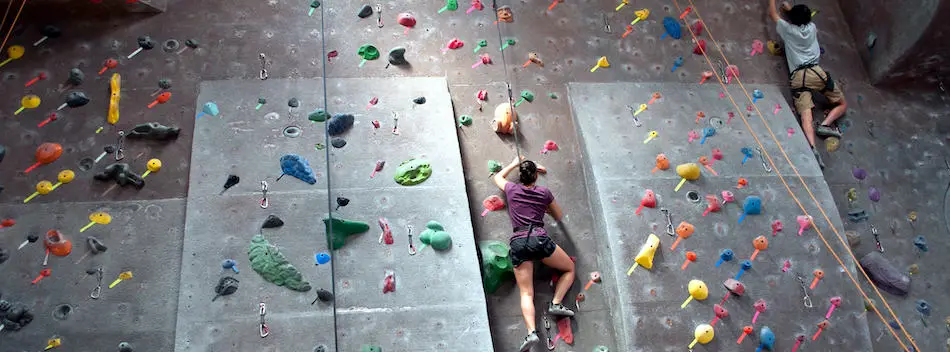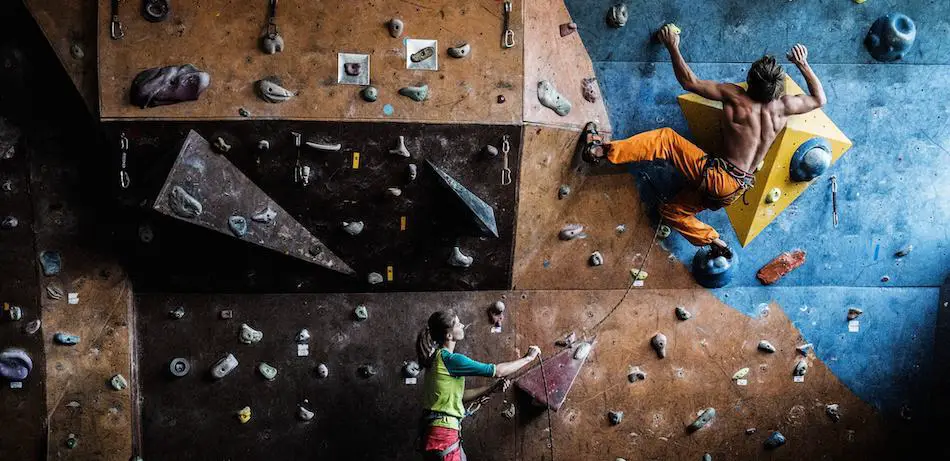
Rock climbing is a great sport, but it can be a little intimidating to start out. When I was a new climber, I wondered if it was possible to teach myself to climb.
You can teach yourself basic climbing skills like bouldering and top roping without needing any instruction. However, if you want to learn more complicated skills such as lead climbing, multi-pitching, or anchor building, you’ll need to get someone to teach you.
If you just want to improve at rock climbing, simply going to the gym and climbing frequently will help you become better. Your body will naturally learn to move more efficiently on the rock, and the muscles in your arms will grow stronger with frequent use. Additionally, free resources like this blog and YouTube can teach you some of the more specific skills. However, some of the more complicated skills require someone else teaching them to you to make sure you’re doing them safely.
Teaching Yourself Rock Climbing
First, let’s dig a little more into the question of whether you can teach yourself rock climbing, because there’s two sides to it.
On one hand, it is possible to teach yourself to climb. You can go to a climbing gym, rent the equipment, and start climbing almost immediately. Over time, as you learn more technique and your strength grows, you’ll find yourself improving as a climber. Many people climb their entire careers without having any type of climbing coach or instructor.
However, there are a lot of different skills that are what I would call ancillary to climbing. While you can teach yourself the strict art of getting up and down a boulder wall, there’s lots of other stuff you’ll need to know if you want to climb outdoors, or go trad climbing, or something of the like.
For these ancillary skills, like belaying, rappelling, or placing trad gear, it’s good to have a more experienced climber (or, better yet, get a professional instructor) teach you how to climb . That’s because climbing is a dangerous sport, and having someone with lots of experience teach you will help make sure you don’t make a rookie mistake and hurt yourself.
For reference, I’ve created the following table showing what skills you can and can’t teach yourself for climbing:
| Climbing skills you CAN teach yourself | Climbing skills you CAN’T teach yourself |
| Basic technique (how to get up the wall) | Lead belaying |
| Advanced technique (heel hooks, drop knees, etc. – watching other climbers is a great way to learn these) | Lead climbing |
| Top rope belaying (by using platforms like YouTube) | Anchor building |
| Strength training | Multi pitch rock climbing |
| Skin care (to avoid blisters, etc) | Trad climbing |
| What equipment to buy | Outdoor bouldering (mat placement, etc are all dangerous and require expert advice) |
| Advanced training techniques | |
| Injury prevention and management | |
| Rappelling |
As you can see, there are more things in the ‘can’t’ category than in the ‘can’ category. However, the good news is that many climbers will go their whole lives without trad climbing, or even multipitching; they therefore don’t need these skills at all, and so they can say they’re a true ‘self-taught’ rock climber.
For the rest of this article, I’ll go over some tips and resources to help you teach yourself climbing!
Utilize Free Resources Such as YouTube and Blogs

Free online resources, like this blog, are great ways to be a self-taught climber. YouTube channels like Lattice Climbing, Ascentionism, and Send Edition all contain helpful videos and tutorials that can be used to learn more about the sport and improve as a climber.
The danger with these methods is that the advice isn’t personalized to you. This makes it harder to apply in a real-life setting. However, if you’re trying to answer basic questions (like what to bring to the gym), these online platforms can be great for giving you the answers.
Watch More Experienced Climbers at the Gym
A lot of rock climbing is about the technique you use. By watching people who are better than you at rock climbing, you’ll be able to see how they tackle certain problems and learn from what they do. Imitating their movements is a great way to learn more technique without having to pay for a climbing coach.
A great tip for this is to find climbers who have the same body type as you. Tall climbers and short climbers often need to do very different moves to get to the top, so finding someone with a roughly similar body type as your own will give you more relevant information.
Ask People for Advice, or ‘Beta’
In rock climbing lingo, ‘beta’ is the sequence of moves that you use to get to the top of a certain problem. Often if you’re stuck on a route, it’s because you don’t have the right beta.
If this happens, don’t be shy to ask other climbers for their advice! People at climbing gyms are usually very friendly, and they love to share their knowledge and help beginners out. By getting them to break down a problem, you’ll be able to try out new techniques that you may not have thought of.
Train Chin-Ups, Core, and Endurance

If you’re a beginner just coming into the sport, I would say that chin-ups, core, and endurance the three most important areas to train to quickly improve your rock-climbing skill. They also come with low injury risks, which is always a plus.
Chin-ups are one of the most important moves in climbing, and one that not a lot of non-climbers can do. Training chin-ups will help you build dynamic strength and help on overhanging routes.
Your core is what keeps you on the wall while you’re rock climbing, so having a strong core is essential. Things like planks, Russian twists, and leg-raises are great exercises to build climbing-specific muscles.
Finally, training endurance will help to slowly build up your forearm and finger muscles in a safe way. Exercises like 4×4’s, ARC circuits, and doing laps on the ‘circuit wall’ are the best way to build up your endurance for rock climbing.
Avoid Hangboarding
A hangboard is a device that, as the name suggests, you hang from on your fingers to strengthen your grip. While they’re great for more advanced climbers, you should avoid them as a beginner. This is because you’ll be at a high risk of injury while hangboarding, while not actually getting that much benefit from the exercises.
Instead of hangboarding, try climbing more routes, or focus on the areas discussed above to boost your strength!

